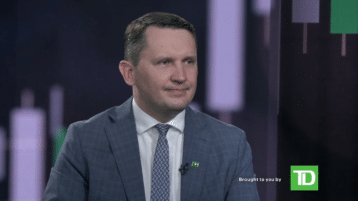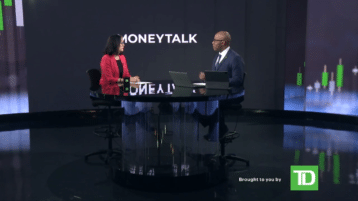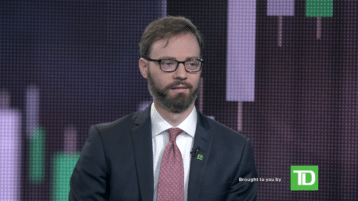Concerns about a potential collapse by a major Chinese property giant is raising fears about a broader impact on the world’s second-largest economy. Anthony Okolie speaks with Haining Zha, Vice President & Director at TD Asset Management, on the potential implications for global markets.
Print Transcript
[MUSIC PLAYING]
- There's a global selloff happening today in the financial markets. Joining me today to talk about what's driving that sell off is Haining Zha. He's a vice president and director at TD Asset Management. Haining, what's happening at Evergrande?
- Well, to give you some background, Evergrande is one of the largest Chinese real estate developers, and it's very heavily indebted. So based on the recent financial statement, the asset liability ratio is well over 80%. And starting from August, the company has suffered a series of negative headlines, which made the company's liquidity gradually dry up. So that is driving the global selloff.
- And what is the source of Evergrande's crisis?
- Well, some people say it's because of the company's holding too much debt, but actually it is because of the Chinese government crackdown on a real estate sector. So if you look at credit expansion, year to date, the overall credit flow was very stable, but credit flow to the real estate sector was very tightly controlled, and that partly triggered the selloff.
- One question that investors are asking is will the Chinese government let Evergrande fall?
- Well, I don't think so, because the Chinese government has always made it clear that they won't allow any systemic risk to happen. But on the other side, we don't expect the Chinese government will bail out Evergrande outright because it will create a very strong moral hazard. So the most likely scenario is the government will actually force the company to continue to dispose of its asset, and gradually deliver over time.
- Now, just last month we saw some weak retail sales in China. Industrial production as well was also weak in August. What impact will this new crisis have on China's economy?
- Right. It might create even more volatility in the Chinese economy. Of course, it depends on how the government will handle it. If it's not well handled, then there might be significant economic pressure down the road. But in the meantime, we don't expect the government, the central bank, to make a huge shift in a monetary policy because their quantity, too-- i.e the credit extension-- is less effective in nature because the credit flow into the real estate sector is still very tightly controlled.
But down the road, given the macro data headwind and also the regulatory action in many of the other industries, for example, tech industries, I think towards the end of the year and in 2022, the PBOC, which is the Chinese government Chinese central bank, might adopt even more dovish bias. And the reserve requirement ratio cut or loan prime rate cut is likely.
- And do you see greater risk of contagion to other markets and economies?
- Right. There are three channels of how the contagion could be transmitted. Number 1 is if you're an institution, and you hold Evergrande offshore US dollar debt, of course, there will be some serious volatility down the road. And number 2, if this case is not well handled by the government, it will create volatility in Chinese economy, which is the second largest economy in the world, which will have its global impact. And third channel is through investment sentiment. Right now the valuation across many risky assets is still quite high, and we think it is very vulnerable for a pullback.
- And with markets trading down, volatility is high in the minds of investors. Do you expect higher volatility for the rest of the year?
- Yeah. In the next little while, yeah. From the Evergrande, yeah, it might be the case. But the global central bank's still pumping a huge amount of stimulus into the economy. So if this tail risk become unmanageable, in their perception, then they might hold their monetary policy to support the economy.
- Haining, thank you very much for your insights.
- You're welcome.
[MUSIC PLAYING]
- There's a global selloff happening today in the financial markets. Joining me today to talk about what's driving that sell off is Haining Zha. He's a vice president and director at TD Asset Management. Haining, what's happening at Evergrande?
- Well, to give you some background, Evergrande is one of the largest Chinese real estate developers, and it's very heavily indebted. So based on the recent financial statement, the asset liability ratio is well over 80%. And starting from August, the company has suffered a series of negative headlines, which made the company's liquidity gradually dry up. So that is driving the global selloff.
- And what is the source of Evergrande's crisis?
- Well, some people say it's because of the company's holding too much debt, but actually it is because of the Chinese government crackdown on a real estate sector. So if you look at credit expansion, year to date, the overall credit flow was very stable, but credit flow to the real estate sector was very tightly controlled, and that partly triggered the selloff.
- One question that investors are asking is will the Chinese government let Evergrande fall?
- Well, I don't think so, because the Chinese government has always made it clear that they won't allow any systemic risk to happen. But on the other side, we don't expect the Chinese government will bail out Evergrande outright because it will create a very strong moral hazard. So the most likely scenario is the government will actually force the company to continue to dispose of its asset, and gradually deliver over time.
- Now, just last month we saw some weak retail sales in China. Industrial production as well was also weak in August. What impact will this new crisis have on China's economy?
- Right. It might create even more volatility in the Chinese economy. Of course, it depends on how the government will handle it. If it's not well handled, then there might be significant economic pressure down the road. But in the meantime, we don't expect the government, the central bank, to make a huge shift in a monetary policy because their quantity, too-- i.e the credit extension-- is less effective in nature because the credit flow into the real estate sector is still very tightly controlled.
But down the road, given the macro data headwind and also the regulatory action in many of the other industries, for example, tech industries, I think towards the end of the year and in 2022, the PBOC, which is the Chinese government Chinese central bank, might adopt even more dovish bias. And the reserve requirement ratio cut or loan prime rate cut is likely.
- And do you see greater risk of contagion to other markets and economies?
- Right. There are three channels of how the contagion could be transmitted. Number 1 is if you're an institution, and you hold Evergrande offshore US dollar debt, of course, there will be some serious volatility down the road. And number 2, if this case is not well handled by the government, it will create volatility in Chinese economy, which is the second largest economy in the world, which will have its global impact. And third channel is through investment sentiment. Right now the valuation across many risky assets is still quite high, and we think it is very vulnerable for a pullback.
- And with markets trading down, volatility is high in the minds of investors. Do you expect higher volatility for the rest of the year?
- Yeah. In the next little while, yeah. From the Evergrande, yeah, it might be the case. But the global central bank's still pumping a huge amount of stimulus into the economy. So if this tail risk become unmanageable, in their perception, then they might hold their monetary policy to support the economy.
- Haining, thank you very much for your insights.
- You're welcome.
[MUSIC PLAYING]



























